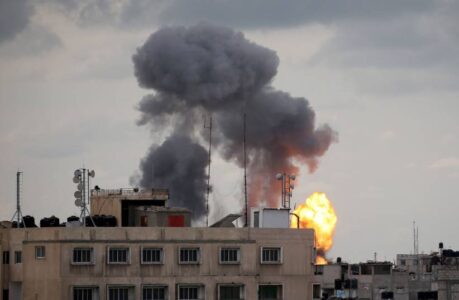
Israeli forces striked Hamas sites after Gaza rocket intercepted
The Israeli army said it struck targets belonging to Hamas in retaliation for a rocket that was fired from the Gaza Strip on Sunday night. The airstrike targeted a cement production facility and underground infrastructure, according to a statement.
The rocket, launched earlier on Sunday evening, had been intercepted by the Iron Dome missile defense system. Rocket sirens had gone off in southern Israeli communities and the rocket was intercepted by Israel’s Iron Dome missile defense system.
In July, three rockets were fired from Gaza at Israel, two of which fell in open areas within Israeli territory and one intercepted. In response, Israeli fighter jets struck Hamas targets in the Gaza Strip. An IDF statement said that among the targets hit were “a workshop to produce rockets as well as infrastructure used to manufacture weapons for Hamas.” No casualties were reported on either side.
Two weeks before that, Israel struck targets in the Strip after a rocket was launched from it at southern communities, in a first since early May. Days earlier, a cluster of balloons that was apparently tied to an explosive device was found near the Israeli village of Tidhar, east of the Gaza Strip, police said.
Hamas’s military wing tested a long-rage missile in the Strip last month. A political source in the organization, which controls the Gaza Strip, estimated that the missile has a range of about 100 kilometers. He told Haaretz that the test was timed in accordance with a statement from the military wing’s spokesman a week earlier, according to which unilateral annexation in the West Bank would be viewed in Gaza as a declaration of war. According to the source, the test was a clear message to Israel that Palestinian groups “Will not carry on as usual if annexation is implemented.”
Senior Palestinian Authority officials have recently said in closed meetings that if Israel does not carry out its plan to annex territory in the West Bank by the end of September, the window of opportunity for annexation will have been narrowed. They said that if Prime Minister Benjamin Netanyahu ends his public support for the move, talks could begin on resuming full security and economic cooperation with Israel.
A recent assessment conducted in the PA and presented to Palestinian President Mahmoud Abbas suggests a number of scenarios, all based on the determination that if Netanyahu and the Trump administration still intend to carry out any annexation plan, it will presumably happen between mid-August and mid-September. The assumption is that the likelihood of annexation will decline with the approach of the United Nations General Assembly in New York and the U.S. election, scheduled for September 15-20 and November 3, respectively.
Source: Haaretz





